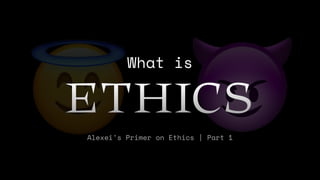What is ethics?
- 1. üòá üòà What is ETHICS Alexei‚Äôs Primer on Ethics | Part 1
- 2. ü§∞ Abortion üêÇ Animal rights üè≥üåà LGBT+ rights üå° Climate change üë¨ Cloning üߨ GMO ü§ñ AI & Robotics üì∏ Surveillance Most of today‚Äôs ‚ö†important issues seem to be the issues of ethics:
- 3. ETHICS But what is ? ? ? ? ? ? ? ? ? ? ? ?
- 4. Very broadly, ETHICS is a üß≠compass that tells you what‚Äôs üòáright and üòàwrong
- 5. ETHICS MORALITY In most cases, is the same as
- 6. Ethical = moral. I know, some people would üôÖdisagree, and perhaps there are situations where these are not the same REALLY? YES.
- 7. Like, when a üë®üíºpublic of fi cial sleeps with a üíãsex worker it‚Äôs immoral, but if he hands a contract to his cousin‚Äôs üèócompany, that‚Äôs unethical
- 8. Right? No.This makes no sense! Both behaviours are üòàbad and describe the same phenomena, even though one is about üí∞money and the other is about üíÉsex.
- 9. Non-experts often claim that ethics is üèücommunal, while morality is üßçprivate*. But üéìprofessionals mostly use these terms interchangeably. * For some bizarre reason the claim is reversed in Russian
- 10. The word moralis was invented by Cicero when he was trying to translate the Greek word ethics to Latin. They both meant the same: manner, custom, law.
- 11. Generally, the terms ethics and morality are used interchangeably. https://www.britannica.com/story/whats-the-difference-between-morality-and-ethics Encyclopedia Britannica
- 12. DESCRIPTIVE ETHICS Non-judgementally studies morality in human communities Here‚Äôs a really ‚ö†important distinction: NORMATIVE ETHICS Passes moral judgement and tells what‚Äôs good, bad or non-moral üî¨ ‚õî
- 13. Moral Philosophy Moral Psychology HOW MORALITY ‚öôWORKS WHAT‚ÄôS üòáGOOD OR üòàBAD So, if you want to study Moral Theology Moral Anthropology DESCRIPTIVE ETHICS NORMATIVE ETHICS The Discipline of Ethics
- 14. QUESTION: How do you draw the line? üòá Moral üòà Immoral üòê Amoral or non-moral Ethics: Not ethics:
- 15. https://journals.plos.org/plosone/article/ fi gure?id=10.1371/journal.pone.0231794.g002 OPINIONS OF üü•REPUBLICANS AND üü¶DEMOCRATS ON ABORTION AND ALCOHOL BAD NEWS: THERE IS NO CLEAR LINE Believe it or not, a substantial minority of republicans (yes, republicans!) think that ü§∞abortion is üòênon-moral
- 16. If you ask üßêphilosophers, the situation, quite predictably, is even more ü§îconfusing.
- 17. In the 1970’s they published a 272-page book, containing various de fi nitions of morality.
- 18. There does not seem to be much reason to think that a single de fi nition of morality will be applicable to all moral discussions. Stanford Encyclopedia of Philosophy https://plato.stanford.edu/entries/morality-de fi nition/
- 19. We don‚Äôt know what ethics is, but there is some consensus on what it‚Äôs üéØfor, what it üì¶contains and what it is probably üö´not GOOD NEWS
- 20. Morality is a set of psychological adaptations that allow otherwise sel fi sh individuals to reap the bene fi ts of cooperation Joshua Greene In fl uential moral philosopher
- 21. So, morality evolved to foster ü§ùcooperation. Some people disagree but there seems to be a lot of consensus on this.
- 22. Theory of ‚òØdyadic morality suggests that what makes judgements moral is perceived üëäharm or üçºcare.
- 23. A man intentionally gished a little girl, who cried. Is the man good or bad? This man is unmistakably üòàbad, even though to gish is not a real verb. We are attuned to sensing harm.
- 24. Also, we know that ethics is not the same as ü뮂öñ law, üèü customs or ü§Æ emotions
- 25. ETHICS IS NOT LAW ü뮂öñ Although law is based on morality, it doesn‚Äôt prohibit all immoral acts, lying is one example. Laws can also be immoral, Nazi laws most certainly were.
- 26. üèü ETHICS IS NOT CUSTOMS The word ethics originally meant customs, but customs can be barbaric. Ethics is not whatever the crowd says. In the Soviet Union going against the crowd was often the hallmark of moral behaviour.
- 27. ü§Æ ETHICS IS NOT EMOTIONS ‚ÄúThese people are just disgusting to me!‚Äù A lot of morally wrong acts are disgusting, but not all disgusting acts are wrong. What disgusts people varies from person to person and from culture to culture.
- 28. ü§Æ emotions ü뮂öñ written law üèü community opinion ETHICS is not any of these things, but there‚Äôs a considerable overlap
- 29. 1 Is a üß≠compass that tells you what‚Äôs üòágood, üòàbad or üòênon-moral 2 Exists because ü§ëself- interested üßçhumans need to ü§ùcooperate WHAT IS ETHICS? 4 Not de fi ned solely by üèücommunity opinion, ü뮂öñlaw or ü§Æemotions but probably has something to do with all of these things 3 Deals with questions of üëäharm or üçºcare Ok, let‚Äôs do a quick recap
- 30. Next: why ethics becomes particularly important TODAY Spoiler: it’s because of rapidly disintegrating religion































